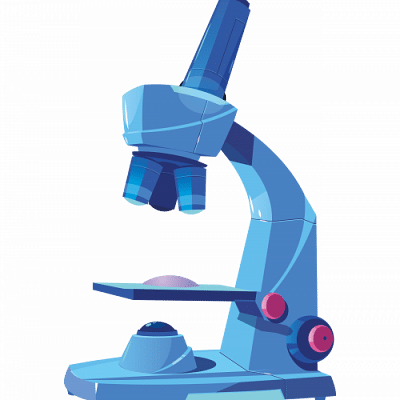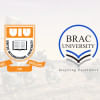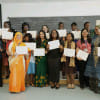Addressing the career struggles for women in STEM

Women in science, technology, engineering and mathematics (STEM) face numerous challenges in their early careers which often have long-lasting impacts on their professional journeys. Despite progress in education, a clear gap remains in both opportunity and representation, leaving many women in STEM grappling with barriers, biases, and isolation. According to the World Bank's Bangladesh Country Gender Assessment 2021, women only made up 14 percent of all STEM professionals as of 2019.
Entering a male-dominated field often means working with people who are biased from the get-go. Afifa Tajrin, an Energy and Environmental, Social, and Governance (ESG) consultant, and founder of Regear, reflects on her early experiences, "Getting oriented in a male-dominated workplace was difficult for me at the beginning of my career. I had to cope with the biased outlooks of my co-workers as they perceived women to be less competent."
Anika Tasnim Shamonty, a product analyst at a renowned ride-sharing company in Bangladesh, has observed similar biases in the workplace. Anika shares, "I have always seen a bias against females in almost all sectors as men are preferred in the STEM workforce. Although hiring has become more inclusive than before, there's still a huge disparity in the number of female employees."
"I assume it is common for all working women to work two or three times as hard as men but still struggle to gain the same recognition. Throughout my career, I've had to put in extra effort just to prove myself. What impacted me the most was that no matter how hard I worked, my shortcomings were highlighted instead of my achievements. I really struggled to keep myself motivated," Afifa added.
The barriers women face not only affect their current roles but also limit their chances of career growth, leading to fewer leadership roles and missed advancement opportunities. Hussna Jalal Ruthila, a quality control and support engineer at Hatim Group of Industries finds advancing her career to be more challenging than her male counterparts. "Implicit biases and fewer networking opportunities make it harder for women in STEM," she said. "Many ideas from my female colleagues are often overlooked and dismissed. We are also often assigned less challenging tasks, and opportunities for fieldwork have also been denied due to perceived difficulties in accommodating women's needs."

Networking is crucial in any field, but it is particularly important in male-dominated industries. "The corporate landscape remains largely male-dominated, but my skills and expertise have allowed me to stand out in my role. Learning from others and staying connected can help access new opportunities. Having a strong support system and building strong professional relationships can increase your visibility and career prospects," says Ananya Praminik, a project control manager at Huawei Bangladesh for whom such connections and learning opportunities have been instrumental in her career growth.
Leadership programmes like Shoktikonna and the WePower Women in Energy & Power Sector Network South Asia have provided invaluable platforms for networking and career development, helping women find peers and mentors in STEM fields. Yet, as Shababa Hossain, co-founder of Dark Kak – a tech startup, points out – accessing these networks isn't always easy for women. "One of the most persistent challenges is the lack of access to valuable networks. With so few women in tech, it's harder for us to connect with mentors, investors, or peers who can help us grow," she says.
Female entrepreneurs in STEM face additional challenges. According to the Mastercard Index of Women Entrepreneurs 2021, Bangladesh ranks at the bottom among 65 countries, partly due to constraints in funding and higher-level education. Shababa shares, "Women entrepreneurs must prove themselves to access more opportunities, yet the restrictions make it difficult to demonstrate their capabilities." She highlights that even when women do connect with investors, they often have to put up with biases that perceive them as less reliable.
Anika believes that the industry should actively work on creating a more inclusive culture. "The industry should introduce and include more female-centric programmes. Adding female mentors could be a great inclusion, and policies dedicated solely to the participation of women would make a significant impact," she suggests.

Despite many shortcomings in the professional realm, an inadequate focus on practical skills and industry exposure in educational institutions also create barriers for women. Kariba Hasan, an executive at the National Solar Help Desk, says, "Although my education provided me with a strong foundation, there were some gaps, especially in terms of practical skills and industry exposure, which I had to address on my own through internships and self-study."
This lack of hands-on experience is echoed by recent data from a SheSTEM study involving insights from 700 STEM students in Bangladesh, which found that 58 percent of the respondents of the study also believe that practical learning experiences are important.
Tarunnyamoye Kundu, an independent researcher specialising in machine learning and smart cities, recalls how this impacted her journey. "I wasn't allowed to stay in my university's computer lab after sunset for coding, though my male peers were," she shares. "Being forced to leave the lab felt unfair and frustrating, especially when I was trying to put in the same effort as my male peers. It was disheartening to have those limitations placed on me simply because of my gender, as though my passion and dedication didn't matter as much."
Kariba believes educational institutions could better support women by offering mentorship programmes, promoting female role models in STEM, creating networking opportunities, and most importantly, providing encouragement. Afifa, who was fortunate to work under supportive managers, emphasises that mentorship can make a profound difference. She advises young women to seek out mentors actively and remain confident in their abilities. Hussna highlights the importance of such environments, "Supportive and inclusive work environments for sure can make a big difference for women in STEM."

With proper support, women can focus on their strengths and progress in their careers without the added pressure of having to overcome stereotypes. For women considering a career in STEM, Afsana Mini, a research consultant at the Center for Environmental and Geographic Information Services (CEGIS), advises to be resilient and curiosity. "Stay curious and be clear about what really attracts you to STEM. Find mentors and don't shy away from difficult subjects," she encourages.
Navigating a career in STEM is challenging as it is. Nonetheless, women can be anything they want to be which is precisely why closing the gender gap in STEM should not just be an afterthought but an initiative to diligently work towards.
Reference:
World Bank (2022). Bangladesh Country Gender Assessment 2021.
SheSTEM (May 2024). Barriers to Bridges: Unveiling Insights & Unlocking Opportunities for Women in STEM.
Mastercard (March 2022). The Mastercard Index of Women Entrepreneurs.

 For all latest news, follow The Daily Star's Google News channel.
For all latest news, follow The Daily Star's Google News channel. 










Comments